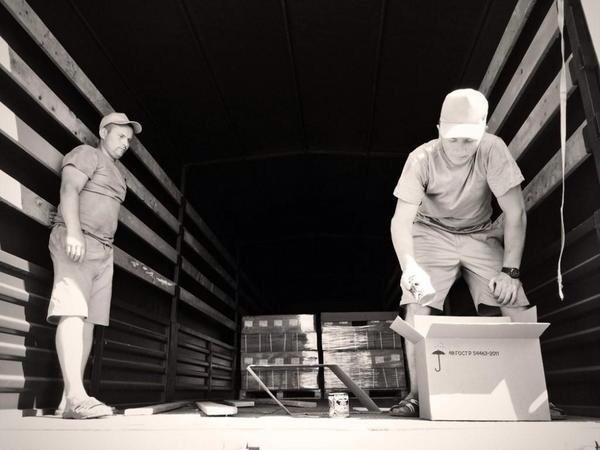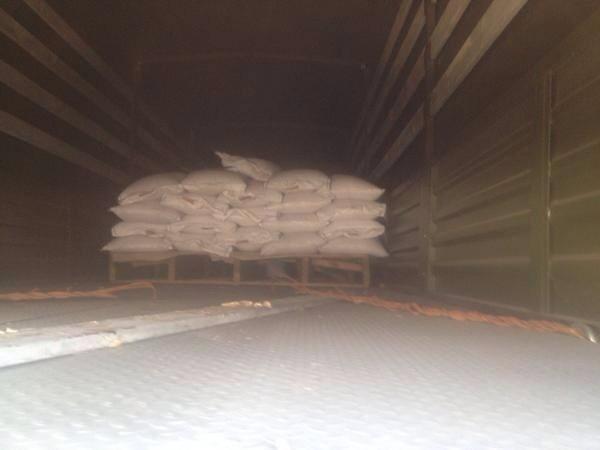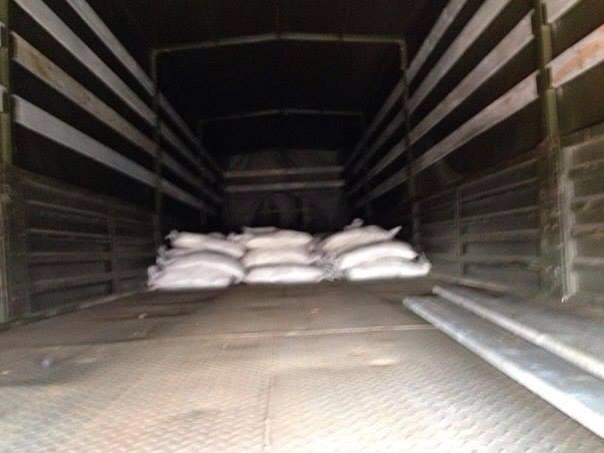A convoy of Russian trucks carrying aid for eastern Ukraine has been opened up to journalists at the border.
The Ukrainian government had insisted that inspectors checked the trucks' cargo, amid fears that they could be carrying military supplies for the rebels - an accusation Russia has rejected.
The BBC's Steve Rosenberg noted that many of the trucks were "almost empty".



Russia's aid convoy is more than half empty.
The Christian Science Monitor: 15. August 2014
What's in Russian aid convoy to Ukraine? Border officials begin to find out.
By Lydia Tomkiw
Officials from Ukraine’s border guards crossed into Russia to inspect the convoy of trucks stopped near the border that Moscow says is carrying humanitarian aid for conflict-ridden eastern Ukraine.
A Ukrainian border guard official told the Associated Press that the convoy is being examined while officials from the International Committee of the Red Cross (ICRC) look on. He said that 41 Ukrainian border guard representatives and 18 customs officials started their work on Friday morning in Kamensk-Shakhtinsky, a town less than 20 miles from the border.
Tensions have been high between Ukraine and Russia since Russia's annexation of Crimea, which involved so-called “little green men” who turned out to be well-trained Russian military personnel. Kiev fears the aid convoy could be used as a pretext for strengthening pro-Russian rebels or even lead to a full-scale conflict.
Although humanitarian aid is desperately needed in eastern Ukraine, with hundreds of thousands displaced by the fighting between Ukrainian government forces and pro-Russia rebels, it remains unclear who the beige-clad truck drivers really are. When questioned about their backgrounds by the Guardian, one driver gave conflicting information:
In general, the men did not want to speak about who they were or how they had come to be involved in the convoy. One said he was a volunteer from a non-governmental organisation, but clammed up when asked for the name of the organisation.
“I’m being paid to do a job here, not to stand around talking to journalists,” he said when pressed, and then looked sheepish when reminded he had just claimed to be an unpaid volunteer.

Over the past two days, convoy drivers have allowed journalists to look into trucks of the drivers' choosing, showing the journalists boxes of new sleeping bags and buckwheat. Some observers have questioned why some of the trucks are not at full capacity:
The exact number of trucks remains unclear, with numbers ranging from 200 to 280 in various reports.
Drivers of Russian aid convoy and white trucks in a field outside the town of KAMENSK-SHAKHTINSKY, Russia.
The convoy was originally supposed to cross in the Kharkiv region of Ukraine that is controlled by the Ukrainian government.
As the Monitor reported yesterday, conflicting reports and rerouting have increased suspicions surrounding the aid offering.
The lack of information has thrust the ICRC into an uncomfortable position with the need to get aid to eastern Ukrainians but not knowing what Russia is planning. This has created worries that any move made by the ICRC could result in serious political implications.
“Putin practices the old KGB technique of maskirovka, masking and deception, in everything he does in this conflict,” Kimberly Marten, a professor at Barnard College and Columbia University, told the Monitor via e-mail. “His goal is to keep people guessing, to create disunity among the Western community, and to buy time before deciding on his next move.”
While the convoy has not yet reached the border, journalists reported seeing Russian military vehicles cross into Ukraine yesterday separately from the humanitarian convoy. A reporter for the Guardian said that he witnessed the passage of “a column of 23 armoured personnel carriers, supported by fuel trucks and other logistics vehicles with official Russian military plates” into Ukraine.
Ukrainian military spokesman Oleksiy Dmytrashkivsky told Reuters that such crossings have become common, and support claims made by the Ukrainian government of Russian involvement in the conflict.
"These movements into Ukrainian territory take place practically every day with the aim of provoking [the Ukrainian side]. Last night was no exception. Some armored vehicles came across. We are checking on the quantity and the number of people who came over," he said.
--------------------------------
Recommended: How much do you know about Ukraine? Take our quiz!
Convoy of Russian trucks remains stalled near border
The convoy of more than 260 trucks that Russia says are filled with food and other aid for civilians caught up in the fighting in eastern Ukraine remained stalled inside Russia on Friday amid confusion over when inspections would start. Ukraine and its Western allies want to ensure that the cargo contains only relief supplies and not items that could help pro-Russian fighters battling to survive a Ukrainian offensive.
A statement early Friday by the Ukrainian military said border guards had started examining the trucks, but the military’s spokesman, Andriy Lysenko, later denied this and said inspections could not begin until the Ukrainian authorities received documents detailing the trucks’ contents.
Mr. Lysenko said Ukraine had sent border guards and customs officials to a Russian border town to examine the trucks but was still waiting for the necessary documentation from the International Committee of the Red Cross. The Red Cross, for its part, said Russia had yet to provide a detailed inventory and called for a speedy resolution of the problem.
In the interim, Red Cross staff members, representatives from the Organization for Security and Cooperation in Europe and more than 50 Ukrainian border guards already on site had nothing to do.
In a statement issued in Geneva, the Red Cross said swift action was need to allow “confirmation of the strictly humanitarian nature of the cargo.”
“As and when agreement is reached, we plan to deliver this humanitarian aid to people affected by conflict in eastern Ukraine, health facilities and other welfare organizations,” Laurent Corbaz, the Red Cross’s head of operations for Europe and Central Asia, said during a visit to the Ukrainian capital, Kiev. “People are struggling to cope with limited access to basic services such as water and electricity, so speed is of the essence.”
At the camp where the trucks were parked overnight, Russian officials and a contingent of young men dressed identically in beige hats, T-shirts and shorts allowed journalists to inspect trucks of their choice for a second straight day. None could say definitively when they would leave.
“A day, two days, two weeks, a month,” said Boris Pashenko, a Ukrainian border service representative.
A convoy of trucks said to be carrying aid await inspection in the town of Kamensk-Shakhtinsky, Russia, near the Ukrainian border.
The trucks were in a border zone close to several military bases, where columns of armored military vehicles driving in the direction of the Ukrainian border are a common sight. Two Western journalists reported seeing 23 armored vehicles crossing a border post into Ukraine on Thursday evening.
Ukraine and the United States have accused Russia of covertly arming pro-Russian rebels in eastern Ukraine.
Russian news agencies quoted an unidentified spokesman for the border guard service as saying that the service, run by the F.S.B. — the successor agency to the K.G.B. — had deployed more mobile teams near the border. The spokesman said this was a response to increased infiltration by Ukrainian servicemen into Russia and more frequent shelling across the border. He denied that any vehicles had crossed the border, calling such reports “completely untrue.”
Sergey Karavaytsev of Russia’s Ministry for Emergency Situations denied that the trucks in the convoy were from the military and said they were hired through private businesses. Masked guards who said they were military police officers also appeared at the camp site late Thursday evening. Members of the Red Cross were also at the convoy’s field camp on Friday, Mr. Karavaytsev said.
In Kiev, Mr. Lysenko said that an agreement had been reached to allow the inspection of the convoy, and the searches would start once the dispute over paperwork was resolved. "Help is needed and we accepted it,” he said, adding that Ukrainian inspectors had already traveled to Donetsk, a small Russian town that has the same name as a separatist stronghold in eastern Ukraine, to begin their work. “But we can’t start the procedure because we don’t have documents.”
While backing away from the angry denunciations that characterized Ukraine’s initial response to Moscow’s relief effort, Mr. Lysenko repeated earlier Ukrainian accusations that Russia was sending military assistance across the border to pro-Russian rebels. He said unspecified military equipment had been moved into Ukraine from Russia through a border area controlled by the pro-Russian separatists.
Helpless people wait in front of a hostel building run by pro-Russian rebels in the center of Donetsk, Ukraine, on August 4, 2014.
Stung by accusations that it is stalling the delivery of Russian relief supplies to the eastern city of Luhansk and is not doing enough to improve the plight of residents caught up in the fighting, Ukraine is sending its own aid convoys to the besieged city. Mr. Lysenko said 71 Ukrainian trucks had been sent to the conflict zone with food, water, tea, soap and other supplies. He said 390 tons of Ukrainian aid had already arrived in Luhansk.
Trucks with Ukrainian humanitarian aid for Luhansk Oblast departed Thursday afternoon from three Ukrainian cities: Kyiv, Kharkiv and Dnipropetrovsk. In Luhansk Oblast, in accordance with international norms, humanitarian aid will be passed to the Red Cross so that the international mission could deliver these goods to the people in need. (August 15, 2014).
He denied rebel claims that Ukrainian forces were responsible for the shelling on Thursday of downtown Donetsk. Mr. Lysenko blamed rebels for the shelling, accusing them of firing into the city from positions near the Donetsk train station, but did not explain why the rebels would fire into a city they control.
Russia announced that Sergey V. Lavrov, the foreign minister, had spoken by telephone with his German counterpart, Frank-Walter Steinmeier, about speeding the passage of the convoy. Aside from the urgent need to get the supplies across the border, the two men also agreed to work toward establishing a cease-fire while the aid is delivered, the Foreign Ministry statement said.

No comments:
Post a Comment